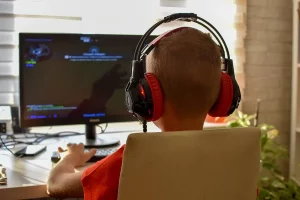Signs He Is Cheating Online: Sudden secretive behavior with his devices and social media accounts could indicate dishonesty.
In the digital age, where virtual connections intertwine with our everyday lives, deciphering the signs he is cheating online becomes a modern-day challenge.
Amidst the pixels and profiles, subtle cues and suspicious behaviors often lurk in the shadows of our screens. Signs He Is Cheating Online.
From clandestine messages to cryptic browsing habits, the digital realm unveils a labyrinth of clues that hint at deception. Signs He Is Cheating Online.
Are his late-night scrolling sessions innocent or a cover-up for clandestine online rendezvous? Unraveling the enigma of online infidelity requires a keen eye and an adept understanding of the virtual landscape. Signs He Is Cheating Online.
Let’s delve into the intricate world of cyber suspicions, where the signs of betrayal manifest in the click of a mouse and the stroke of a keyboard. Signs He Is Cheating Online.

Signs He Is Cheating Online
Changes in Behavior
Significant alterations in behavior can signal potential infidelity. If your partner suddenly becomes overly protective of their phone or computer, exhibits secrecy about online activities, or spends excessive time online without a clear explanation, it could indicate dishonesty.
Emotional Distance
Emotional detachment is a common indicator of online cheating. If your partner appears distant, uninterested in communication, or expresses disinterest in spending time together, it may suggest emotional investment elsewhere, possibly in online interactions.
Secrecy and Privacy
Heightened secrecy and privacy regarding online activities can be telling signs.
Password changes, reluctance to share passwords, or hastily closing tabs or messages when you’re nearby may indicate efforts to conceal online interactions.
Excessive Defensiveness
Overly defensive reactions to inquiries about online behavior could imply guilt.
If your partner becomes defensive, dismissive, or overly aggressive when questioned about their online activities, it may be a red flag warranting further investigation.
Unexplained Expenses
Unexplained expenses related to online activities, such as subscriptions to dating sites or purchases from unknown vendors, could indicate clandestine behavior.
Financial discrepancies or unaccounted-for charges may raise suspicions of online infidelity.
Behavioral Changes
Increased Secrecy with Devices
Password Changes
Individuals may exhibit heightened secrecy by frequently altering their passwords, often without clear justification or explanation.
Hiding Screens or Minimizing Windows
Another sign of increased secrecy is the habit of concealing screens or minimizing windows when others approach, indicating a desire to keep online activities private.
Unexplained Absences or Excessive Time Spent Online
Decreased Time Spent Together
Notable decreases in shared time together may occur as individuals increasingly devote excessive periods to online activities, often without reasonable explanation.
Preferring to be Alone with Devices
A preference for solitude with electronic devices over social interaction can signal a shift towards secretive behavior, where individuals withdraw to engage in online activities away from prying eyes.
Sudden Interest in Privacy Settings on Social Media Accounts
Changing Privacy Settings Frequently
A sudden and frequent alteration of privacy settings on social media platforms suggests a newfound concern for personal information protection and a desire to limit visibility to others.
Unwillingness to Share Passwords or Account Information
Refusal to share passwords or account details with others reflects a heightened sense of privacy and a reluctance to divulge online activities or interactions to individuals in their social circle.
Emotional Distance
Decreased Communication and Affection
Decreased communication and affection often manifest as fewer expressions of love and affection and a lack of interest in spending quality time together.
Partners may find themselves drifting apart, experiencing a noticeable decline in the warmth and closeness they once shared.
Fewer Expressions of Love and Affection
Expressions of love and affection become scarce, leaving partners feeling unappreciated and disconnected.
Small gestures and affectionate words are replaced with silence or indifference, creating a palpable emotional gap.
Lack of Interest in Spending Quality Time Together
Interest in spending quality time together wanes, leading to missed opportunities for bonding and connection.
Shared moments that used to strengthen the relationship now feel strained or non-existent, contributing to feelings of loneliness and isolation.
Withdrawal from Shared Activities or Hobbies
Withdrawal from shared activities or hobbies is evident as partners begin to avoid activities they once enjoyed together.
The allure of solitary online activities becomes more appealing, further isolating individuals within the relationship.
Avoidance of Activities Previously Enjoyed Together
Activities that once brought joy and companionship are sidelined, leaving partners to pursue their interests independently.
This avoidance creates a void where shared experiences used to flourish, deepening the emotional distance between them.
Increased Preference for Solitary Online Activities
An increased preference for solitary online activities replaces the shared enjoyment of hobbies and outings.
Partners retreat into virtual realms, seeking solace and distraction from the growing chasm in their relationship.
Lack of Transparency in Online Interactions
Lack of transparency in online interactions becomes apparent as partners avoid discussing their online activities.
When questioned, defensive or evasive responses further obscure the truth, exacerbating feelings of distrust and suspicion.
Avoidance of Discussing Online Activities
Partners steer clear of discussing their online pursuits, creating a veil of secrecy around their digital lives.
This lack of transparency fosters uncertainty and undermines the foundation of trust essential for a healthy relationship.
Defensive or Evasive Responses When Questioned About Online Behavior
When confronted about their online behavior, partners respond defensively or evade the issue altogether.
This defensive stance heightens suspicions and erodes the trust necessary for open communication and intimacy.

Suspicious Online Behavior
Excessive Use of Dating or Hookup Apps
Frequent Activity on Dating Platforms
Individuals displaying a compulsion for swiping and messaging.
Repeated login and engagement patterns on dating applications.
Profiles on Multiple Dating Sites or Apps
Presence across various platforms for dating or casual encounters.
Wide-ranging profile creation on multiple dating services.
Secretive Communication with Unknown Individuals
Hiding Chats or Messages from View
Concealing conversations from prying eyes or partners.
Secrecy in digital communication, possibly indicating illicit conversations.
Deleting Message History or Using Secure Messaging Apps
Erasing traces of communication to maintain secrecy.
Employment of encrypted messaging platforms for covert exchanges.
Maintaining Active Profiles on Social Media Platforms for Single Individuals
Likelihood of Interaction with Potential Romantic Interests
Continuously engaging with social media to connect with new prospects.
Opportunities for initiating or pursuing romantic relationships through online platforms.
Flirtatious or Suggestive Comments or Messages
Displaying behavior suggestive of romantic or sexual interest.
Utilizing social media for flirtatious exchanges, possibly beyond casual interaction.
Financial Red Flags
Unexplained Expenditures Related to Online Interactions
Charges from Dating or Adult Entertainment Websites
Unexplained expenditures from dating or adult entertainment websites can be a significant financial red flag, signaling potential hidden activities or indulgences.
It’s essential to scrutinize any unusual charges from such platforms, as they may indicate undisclosed personal engagements or subscriptions.
Increased Spending on Gifts or Activities for Unknown Individuals
A sudden surge in spending on gifts or activities for unknown individuals can raise suspicions regarding undisclosed relationships or financial commitments.
It’s crucial to investigate any unexplained rise in expenditure directed towards unfamiliar individuals, as it could suggest clandestine financial dealings or hidden personal engagements.
Hidden Financial Transactions
Use of Separate Accounts or Payment Methods
The utilization of separate accounts or payment methods without transparent justification can be indicative of concealed financial transactions or undisclosed financial activities.
It’s imperative to closely monitor any divergence in financial behavior, such as the establishment of separate accounts or payment channels, as it may signify attempts to obscure financial dealings or hide monetary assets.
Unexplained Withdrawals or Transfers
Unexplained withdrawals or transfers from accounts can be a significant financial red flag, hinting at potential hidden financial transactions or undisclosed financial commitments.
It’s essential to thoroughly examine any unexplained movements of funds, as they may indicate attempts to conceal financial activities or obscure the trail of monetary transactions.
Changes in Appearance and Behavior
Increased Focus on Physical Appearance
Buying New Clothes or Grooming Products
Individuals may exhibit an enhanced interest in their appearance, often manifested through the purchase of new clothes or grooming products. This behavior could signal a desire for self-improvement or a change in personal style.
Hitting the Gym More Frequently
An uptick in gym attendance may indicate a heightened focus on physical fitness and appearance. This could be driven by aspirations for a healthier lifestyle or a desire to achieve specific body goals.
Unexplained Changes in Routine or Habits
Alterations in Sleep Patterns
Changes in sleep patterns, such as insomnia or oversleeping, might signify underlying stress or anxiety. These alterations can affect overall well-being and may indicate the need for further evaluation.
Secretive Behavior Regarding Whereabouts or Activities
Instances of secretive behavior, like withholding information about one’s whereabouts or activities, could suggest a desire for privacy or concealment of certain behaviors.
This shift in openness may raise concerns about trust and communication within relationships.
Gut Instinct and Intuition
Trusting Your Instincts
Recognizing When Something Feels Off
Trusting your gut feelings.
Intuitive awareness.
Sensing discomfort or unease.
Sometimes, we just know when something isn’t quite right. It’s that inexplicable feeling in the pit of your stomach, a nagging sense that refuses to be ignored.
Trusting your instincts means paying attention to these subtle cues and recognizing when something feels off.
The Importance of Open Communication in Relationships
Building trust.
Creating a safe space for honesty.
Fostering understanding and empathy.
Open communication is the cornerstone of healthy relationships. It allows partners to share their thoughts, feelings, and concerns openly, without fear of judgment or reprisal.
By fostering open communication, couples can strengthen their bond and address any issues that may arise with honesty and respect.
Seeking Support from Friends or Family
Sharing Concerns and Observations with Trusted Confidants
Seeking advice.
Venting frustrations.
Receiving validation and support.
When faced with uncertainty or doubt, it can be helpful to confide in trusted friends or family members.
Sharing your concerns and observations allows you to gain perspective and insight from those who know you best, offering validation and support in times of need.
Seeking Advice on How to Address Suspicions with Partner
Finding a resolution.
Seeking clarity and understanding. Working towards mutual trust and transparency.
If you’re unsure how to address suspicions or concerns with your partner, seeking advice from friends or family can provide valuable guidance.
They can offer perspective on how to broach the subject with sensitivity and honesty, helping you navigate difficult conversations and work towards a resolution together.
Behavioral Signs
Increased Secrecy Around Devices
Password Changes
Individuals may frequently change their passwords, indicating a desire to maintain privacy and control over their online accounts.
Altering access codes or passwords on various platforms could signify an attempt to conceal online activities from others.
Guarding Devices
People might become more protective of their electronic devices, keeping them close at all times and showing reluctance to share them with others.
Heightened vigilance over smartphones, tablets, or laptops suggests a desire to control access to personal information.
Unexplained Absences or Late Nights Spent Online
Sudden disappearances or extended periods spent online during odd hours without reasonable explanation could indicate involvement in secretive online behavior.
Unaccounted-for time or late-night usage patterns might suggest engagement in activities that individuals wish to keep hidden from others.
Excessive Time Spent on Social Media or Messaging Apps
Excessive usage of social media platforms or messaging applications beyond usual patterns might signal an attempt to establish connections or engage in conversations discreetly.
Persistent engagement with online platforms could reflect an effort to escape reality or maintain virtual relationships away from prying eyes.
Sudden Interest in Privacy Settings on Social Media Accounts
A sudden focus on adjusting privacy settings on social media accounts may indicate a desire to control who can view personal information and activities.
Heightened attention to privacy features suggests a newfound awareness of the need to protect oneself from unwanted scrutiny or exposure.

Emotional Signs
Detachment or Lack of Interest in Intimate Conversations
In relationships, detachment or disinterest in intimate conversations can be a sign of underlying emotional strain. Partners may notice a lack of engagement or enthusiasm when discussing personal or intimate topics.
This withdrawal can manifest as reluctance to share thoughts, feelings, or experiences that would typically deepen emotional connection.
Guilt or Defensiveness When Questioned About Online Activity
Feelings of guilt or defensiveness arising from questioning about online activity can indicate hidden behaviors or concerns.
Partners may become defensive when confronted about their online interactions, possibly indicating a breach of trust or engagement in activities they wish to keep secret.
This behavior often suggests a need for open communication and reassurance within the relationship.
Disinterest in Spending Quality Time Together Offline
A decline in interest in spending quality time together offline can signify a shift in emotional priorities or disconnection. Partners may notice a decrease in enthusiasm for shared activities or outings, preferring solitary pursuits or time spent online.
This disinterest in offline bonding experiences can strain the emotional intimacy and connection within the relationship.
Emotional Distance or Lack of Connection
Emotional distance or a sense of disconnectedness between partners can erode the foundation of a relationship. Signs may include a lack of emotional responsiveness, limited affection, or an inability to empathize with each other’s experiences.
This emotional gulf often results in feelings of loneliness or isolation within the relationship, highlighting the need for open communication and efforts to rebuild connection.
Communication Patterns
Frequent Texting or Messaging with Someone Unfamiliar
Engaging in regular communication with unknown individuals via text or messaging platforms can raise concerns about privacy and safety.
It’s essential to exercise caution when interacting with strangers online to avoid potential risks associated with cyberbullying, scams, or harassment.
Maintaining boundaries and verifying the identity of the person you’re communicating with can help safeguard your online interactions.
Use of Secret Messaging Apps or Secondary Social Media Accounts
The utilization of clandestine messaging applications or secondary social media profiles may indicate a desire for privacy or secrecy in communication.
While some individuals may use these tools innocently for private conversations, others might employ them to conceal inappropriate or illicit activities.
Monitoring and understanding the reasons behind the use of such platforms can provide insights into an individual’s intentions and behavior.
Abrupt Changes in Communication Habits
Unexpected shifts in communication habits, such as sudden increases or decreases in messaging frequency, could signify underlying issues or changes in circumstances.
These alterations might indicate emotional distress, relationship conflicts, or attempts to hide certain aspects of one’s life. Paying attention to these changes and initiating open discussions can help address any concerns and maintain healthy communication dynamics.
Hiding or Deleting Messages
The act of concealing or erasing messages could point towards attempts to withhold information or cover up communication exchanges. Deleting messages might be done to hide inappropriate content, avoid confrontations, or maintain secrecy.
However, such actions can undermine trust in relationships and create suspicion. Encouraging transparency and honesty in communication can foster stronger connections and mitigate the need for secrecy or deletion of messages.
Financial Clues
Unexplained Expenses Related to Online Activities
Uncovering irregularities in financial records, such as unexplained expenses tied to online activities, including subscriptions and gifts, can raise red flags.
Individuals may find unexpected charges on their bank or credit card statements without a clear rationale behind them. These charges could indicate unauthorized transactions or hidden online activities.
Changes in Spending Patterns Without Reasonable Explanation
An abrupt shift in spending habits without a logical explanation can signify potential financial discrepancies.
People might notice significant increases or decreases in their expenses for various goods and services, without any apparent changes in their circumstances.
This sudden alteration could hint at hidden financial activities or undisclosed purchases.
Hidden Credit Card Statements or Receipts
Concealing credit card statements or receipts from scrutiny could indicate an attempt to hide financial transactions.
Individuals may deliberately keep these documents out of sight to prevent others from uncovering their spending habits or online activities. Such behavior might suggest a desire to conceal illicit purchases or subscriptions.
Behavioral Changes in Real Life
Increased Interest in Personal Appearance or Grooming
Individuals may display a sudden preoccupation with their looks or grooming habits, spending excessive time on tasks like hairstyling, makeup application, or clothing selection.
This heightened focus on appearance can be noticeable to those around them, with friends or family members observing a marked change in their overall presentation.
Unexplained Absences or Excuses for Being Away from Home
People experiencing behavioral changes might offer vague or inconsistent explanations for their whereabouts, frequently citing reasons for being away from home that seem dubious or unconvincing.
They may exhibit a pattern of disappearing for extended periods without providing concrete details about their activities or destinations.
Difficulty Maintaining Eye Contact or Acting Nervously
A noticeable shift in social behavior may manifest through increased nervousness or an apparent struggle to maintain eye contact during conversations.
This change can be particularly evident in situations where the individual previously demonstrated confidence or ease, leading others to perceive them as evasive or apprehensive.
Changes in Sexual Behavior or Preferences
Alterations in sexual behavior or preferences may become apparent, with individuals exhibiting shifts in their approach to intimacy or expressing interest in activities or experiences they previously showed little inclination towards.
This change can raise concerns among partners or close associates who observe deviations from established patterns of behavior.
Digital Forensic Evidence
Reviewing Browsing History and Cache Files
In digital forensic investigations, analyzing browsing history and cache files is crucial for uncovering evidence. Examining these records provides insights into an individual’s online activities and interests, shedding light on their browsing habits and visited websites.
It allows forensic experts to trace a user’s online footprint, uncover potentially illicit activities, and establish a timeline of events.
Tracking Location Data from Devices
Tracking location data from devices is a pivotal aspect of digital forensics, enabling investigators to pinpoint a user’s whereabouts at specific times.
By scrutinizing GPS logs and location history, forensic analysts can reconstruct movement patterns, verify alibis, and correlate digital activities with physical locations.
This information is instrumental in criminal investigations, providing valuable evidence to support or refute claims made by suspects.
Analyzing Social Media Interactions and Messages
Analyzing social media interactions and messages plays a vital role in digital forensic examinations, offering valuable insights into a person’s social connections, behaviors, and communications.
By scrutinizing posts, comments, and private messages, investigators can uncover relevant information, such as conversations related to criminal activities, associations with suspects, or plans for illegal behavior. This data provides crucial context for understanding a subject’s motivations and intentions.
Using Spyware or Monitoring Software (Ethical Considerations)
Using spyware or monitoring software raises significant ethical considerations in digital forensic practice. While such tools can be valuable for gathering evidence and monitoring suspect activities, their usage must adhere to legal and ethical standards.
Forensic experts must ensure that the deployment of spyware is authorized by relevant laws and regulations, respects individuals’ privacy rights, and is conducted transparently and responsibly.
Failure to uphold ethical principles in using these tools can compromise the integrity of the investigation and infringe upon civil liberties.
Trust Building and Communication
Open Dialogue about Concerns and Suspicions
Open communication is key in any relationship. It’s important to openly discuss any concerns or suspicions that may arise. Transparency fosters trust and understanding between partners.
By addressing issues head-on, you can prevent misunderstandings and build a stronger bond. Honest conversations allow both parties to express their feelings and work towards resolution.
Establishing Boundaries and Expectations in the Relationship
Setting clear boundaries and expectations is crucial for maintaining a healthy relationship. Each individual has their own needs and preferences, and it’s essential to respect them.
By establishing boundaries, you create a framework for mutual respect and understanding. This clarity helps prevent conflicts and promotes harmony in the relationship. Open communication about expectations ensures that both partners are on the same page.
Seeking Professional Help or Counseling if Needed
Sometimes, communication challenges may require professional guidance. Seeking help from a counselor or therapist can provide valuable insights and tools for improving communication and trust.
Professional assistance offers a neutral space for both partners to express themselves and address underlying issues.
Therapy sessions can help strengthen the relationship and provide strategies for overcoming obstacles. Don’t hesitate to seek help if communication difficulties persist, as it can lead to a healthier and more fulfilling partnership.

FAQs
What are the common signs he is cheating online?
There are several indicators, including sudden secrecy with devices, excessive time spent online, unexplained charges, and sudden changes in behavior or routine. Signs He Is Cheating Online.
How can I tell if my partner is cheating on me online?
Look for inconsistencies in their online activity, such as frequent password changes, secretive behavior with their devices, or sudden defensive reactions when questioned about their online habits. Signs He Is Cheating Online.
Are there specific signs in online communication that suggest infidelity?
Yes, signs like a sudden increase in private messaging, reluctance to share passwords or devices, and engaging in secretive or inappropriate online conversations can indicate potential cheating. Signs He Is Cheating Online.
What should I do if I suspect my partner is cheating online?
Approach the situation calmly and communicate your concerns openly with your partner. Consider seeking couples therapy or counseling to address trust issues and work towards resolution. Signs He Is Cheating Online.
Can monitoring my partner’s online activity help me confirm if he is cheating?
While monitoring may provide insight, it’s essential to respect privacy and trust in the relationship. Open communication and addressing concerns directly are often more effective in resolving doubts. Signs He Is Cheating Online.
Is there a way to rebuild trust if my partner has been cheating online?
Rebuilding trust takes time, honesty, and effort from both partners. Establishing clear boundaries, seeking professional help if needed, and committing to open communication can aid in the process. Signs He Is Cheating Online.
Are there warning signs in social media behavior that indicate online infidelity?
Yes, signs like excessive liking or commenting on someone else’s posts, maintaining secret social media accounts, or hiding online interactions can be red flags for potential cheating. Signs He Is Cheating Online.
What role does technology play in facilitating online infidelity?
Technology provides anonymity and accessibility, making it easier for individuals to engage in secretive online behavior, such as flirting, sexting, or maintaining multiple online personas. Signs He Is Cheating Online.
How can I protect myself from falling victim to online cheating?
Maintain open communication with your partner, establish mutual trust and respect, and be mindful of any suspicious behavior or red flags in online interactions. Signs He Is Cheating Online.
Is online cheating as harmful as physical infidelity in a relationship?
Yes, online cheating can be equally damaging as it undermines trust and emotional intimacy in the relationship, leading to feelings of betrayal and insecurity. Signs He Is Cheating Online.
Conclusion
In conclusion, recognizing signs he is cheating online is essential for maintaining trust and transparency in any relationship.
From secretive behavior with devices to sudden changes in online habits, these warning signals can’t be ignored. Signs He Is Cheating Online.
It’s crucial to address concerns openly and honestly, fostering communication and understanding between partners. Signs He Is Cheating Online.
By staying vigilant and aware of the signs he is cheating online, individuals can protect their emotional well-being and make informed decisions about the future of their relationship. Signs He Is Cheating Online.

